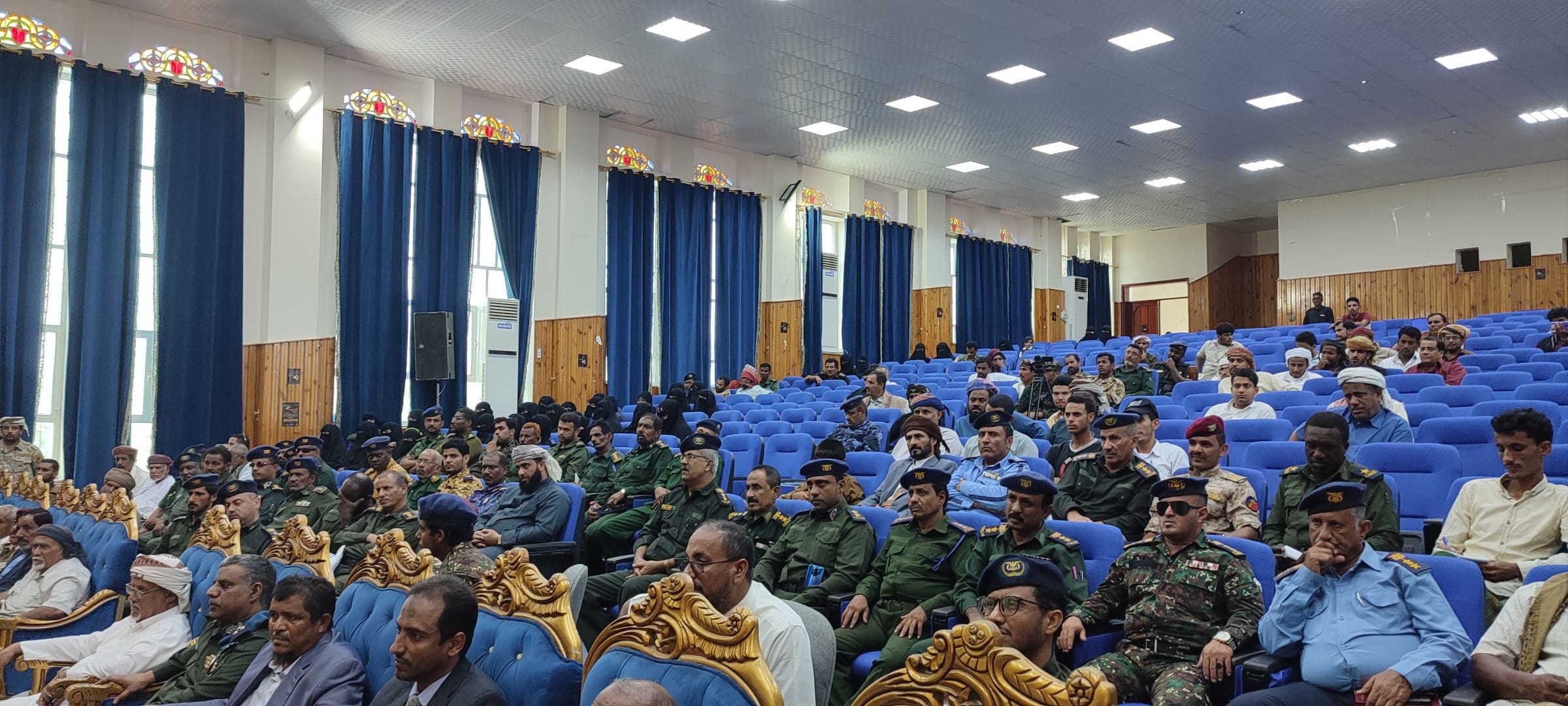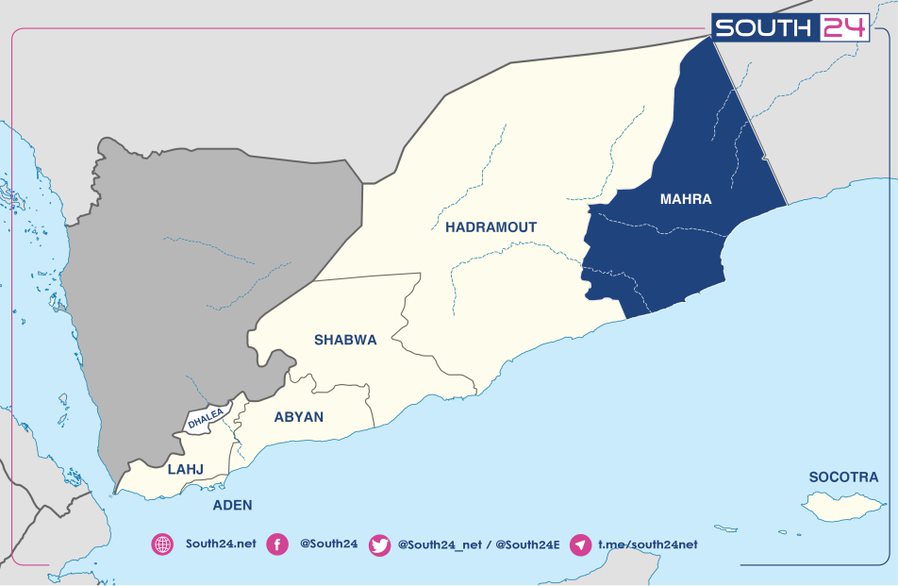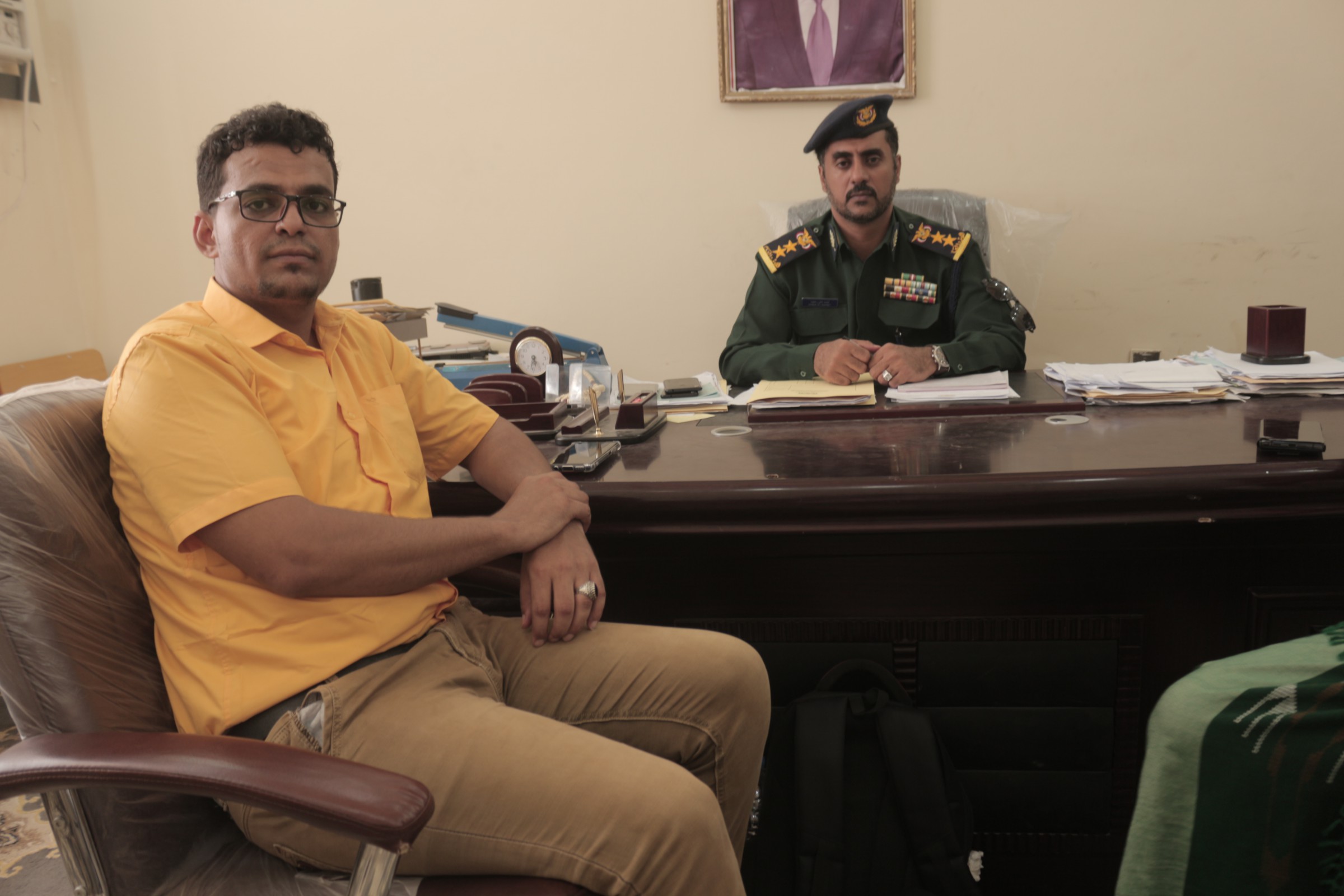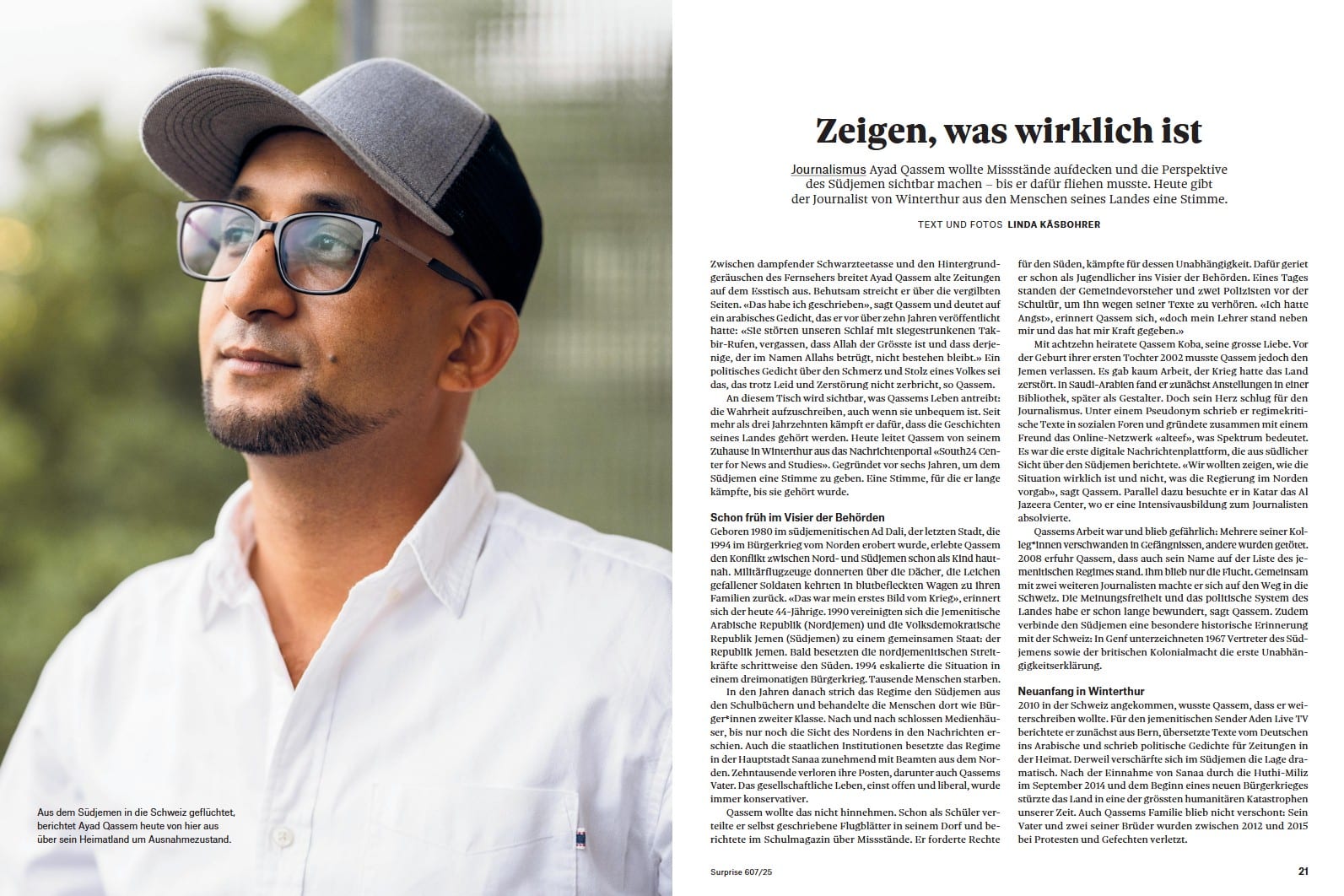
Northern officers at a seminar organized by the Al-Mahra Authority in Al-Ghaydah city, June 26, 2022 (South24)
آخر تحديث في: 30-08-2022 الساعة 8 صباحاً بتوقيت عدن
Abdullah Al-Shadli (South24)
At 10:00 AM, miles away from Al-Mahra's capital, Al-Ghaydah, we passed by a checkpoint where we met a soldier who apparently was under the Qat influence. He didn’t even bother asking us or carrying out a traditional search to assure that the passengers carry no prohibited substances. He nodded his head to the driver of our vehicle to let us go.
We were banned from taking pictures of soldiers or the checkpoint which was not apparently strong enough to prevent any possible smuggling of weapons and prohibited substances. For Al-Mahra’s locals who spoke with us along the road, most checkpoints in the governorate are completely similar to the one we passed by where there are Northern soldiers who came from outside the governorate long years ago.
There are numerous military brigades in Al-Mahra including the 123 Infantry Brigade in Hat district and the 137 Mika Brigade in Al-Ghayda district. All of these brigades are controlled by Northern military commanders, foremost of whom is Major General Mohammed Ahmed Al-Qadi who is accused of forging links with the Houthis according to sources in the local authorities who spoke to “South24” and asked for anonymity.
Al-Mahra’s people call for the departure of these Northern forces and sending them to the Northern fronts against the Houthis as well as the establishment of local military forces from the governorate’s locals. These popular demands are led by the General Council of the People of Mahra and Socotra, led by the prominent figure in Al-Mahra, Sultan Abdullah bin Essa Al-Afar, who is also a member of the STC.
Occupation?
"The Northern military leaders and influential figures in Al-Mahra fight any military commander who is loyal to South and this land" according to Mehdi Hassan Belhaf, the STC's deputy director in Al-Mahra. He told "South24" that "elements who are hostile to the governorate refuse the recruitment of Al-Mahra's people to secure their governorate like the Hadrami Elite in the Hadramout's coast and other Southern governorates".
He added: "The recruitment of Al-Mahra people will remain on the top priorities for us. This is one of our rights. We won't accept the ongoing control and the recruitment of Northerners at the expense of Al-Mahra's citizens. This enhances the Northern occupation of the governorate and an extension to the policies of the Northern forces, and parties in Al-Mahra", according to him.
On the other hand, Al-Mahra's Deputy Security Chief Colonel Ahmed Ali Raafit told "South24" that “Northerners in Al-Mahra are Yemenis. In military and security circles, there is no discrimination between the people of the same country". He added: "Al-Mahra's people are present in the military circle in general".
Risks
Political analyst Salah Al-Saqladi told "South24" that "the threat of the Northern military presence in Al-Mahra is no less than the danger of the 1'st Military region in Wadi Hadramout". He added: "The continuous presence of these forces necessarily means the obstruction of the Southern political project on the ground".
STC official in Al-Mahra Mehdi Belhaf believes that "the ongoing presence of the Northern Forces in Al-Mahra threatens South". He claimed that "these forces have close ties with the Houthis, the Muslim Brotherhood and the smuggling mafias".
Journalists and officials in Al-Mahra told "South24" that the Northern forces in the governorate support local armed groups who have hostile attitude towards the Saudi-led Coalition and forge close ties with the Houthis and Oman such as the group affiliated with the tribal Sheikh Ali Salem Al-Huraizi.
Military expert Waddah Al-Oubali told "South24" that "the collusion of some units and military formations in Al-Mahra with Al-Huraizi group is not a self-complicity but it is instructed by Oman in return for some support and privileges" according to him.
Regarding the relationships of the military forces in Al-Mahra and Al-Huraizi group with the Houthis, Al-Saqladi believes that "the ties are continuous and may witness more development and publicity, especially that Al-Huraizi and the Islah feel they are marginalized due to the latest appointments that the party feels are targeting it."
On the other hand, Ahmed Raafit said that “Al-Huraizi is a tribal man and that all tribes are armed and have their own elements”. The security official added that what Al-Huraizi does is no more than tribal activities which do not pose any threat against the governorate or the state".
Some Yemeni forces fear that the decline of their leverage in Al-Mahra will lead to the occurrence of what they describes as the "separation of South Yemen" which was an independent state till 1990, especially that most of the Northern territories became under the Houthi control.

Some Yemeni forces fear that the decline of their leverage in Al-Mahra will lead to the occurrence of what they describes as the "separation of South Yemen “which was an independent state till 1990 (South24).
The Saudi presence
On October 29th 2021, local sources in Al-Mahra told "South24" that KSA withdrew a big number of its forces in the governorate concurrently with similar withdrawal from Shabwa.
In spite of these withdrawals, analysts and officials believe that KSA still enjoys a prominent military presence in Al-Mahra due to the importance of the governorate and its being bordered by the rival Oman.
On this regard, Al-Saqladi said that KSA is determined to consolidate its influence in a governorate seen by Riyadh as capable of being an oil window for KSA as it overlooks the Arabian Sea and is close to the oil markets. It can also serve as a way to avoid the Strait of Hormuz.
However, Al-Oubali believes that the "KSA presence in Al-Mahra became limited to Al-Ghaydah Airport and another base". He added: "This presence is no longer as it was in 2019".
On the other hand, Al-Mahra's Deputy Security Chief confirmed to "South24" the presence of Saudi forces on the ground. He added: "These forces always support us on the security level. We don't know whether these forces will withdraw".
Weapon smuggling
Over past years, Al-Mahra has topped the headlines regarding the attempts to smuggle weapons to the Houthis via land and maritime lanes of the governorate. Many of these attempts were aborted by the Saudi forces in the governorate and the border guards. Observers and experts believe that the Northern military control on Al-Mahra made it one of the most prominent smuggling paths for the Houthis.
Al-Saqladi expressed his feelings of surprise by saying: "The long thousands of kilometers journey of weapons via Al-Mahra, which is controlled by the Arab Coalition and the internationally-recognized government, to ultimately reach the Houthis would not have succeeded without the presence of governmental parties colluding with the Houthis".
Al-Oubali told "South24" that "security and military divisions and contrasts generally serve smugglers". He added: "All of this created a fertile environment to smuggle arm shipments and pass them through special and defined trajectories to some areas inside Yemen".
Al-Oubali indicated that "all data and reports confirm that Al-Mahra is one of the most important smuggling lanes to Yemen". The expert noted that Al-Mahra “enjoys a strategic location adjacent to Oman and close to the Iranian coast".
Related: Al-Mahra: Another Theatre of Tussles in the Complicated Yemeni War
On the other hand, Raafit refused allegations that the governorate is the basic lane for smuggling weapons to the Houthi. He linked this to the Northern military and security forces.
Raafit said: "All areas that overlook the sea are considered smuggling lanes. This takes place in Hadramout and Al-Hodeida. While some accuse the military forces in Al-Mahra of cooperating with the Houthis for smuggling operations, the security official said: "We don't accuse any particular party. The security bodies carry out their roles and their religious and national duties at the best way".

"South24"'s reporter Abdullah Al-Shadli with Al-Mahra's Deputy Security Chief Colonel Ahmed Raafit. (South24)
Moving the Northern forces
Community and political forces in Al-Mahra, foremost of which are the General Council of the People of Mahra and Socotra and the STC call for the departure of the Northern forces from the governorate and to replace them by locals. There are similar demands in the nearby Hadramout.
In this regard, Al-Oubali said: "I don't think that Al-Mahra will be an exception to Hadramout but will be an extension to it regarding any procedures related to the political affairs as well as security and military affairs".
On Tuesday, Yemeni Interior Minister Major General Ibrahim Haidan issued a decision to appoint the Northern officer Saleh Mohammed Nasser Al-Maori, who is close to the Islah, as Special Forces Commander in Al-Mahra to succeed Colonel Sha'i Al-Alahi. During a meeting on Wednesday, the General Council of the People of Mahra and Socotra refused the decision.
On his Facebook page, Al-Afrar wrote: "There is no space for arbitrary decisions or accepting importing military and civilian outsider leaders. This requires standing together by all parties to counter the imminent threats against the governorate and its people".
Journalist and editor at South24 Center for News and Studies
This report is part of a series of field reports during the visit of the South24 Center team to Al-Mahra governorate
To read the previous two reports:
Are Demographic Changes Taking Place in Al-Mahra?
Al-Mahra: When Citizens Starve and Alienated in their Homeland

قبل 3 أشهر

قبل 3 أشهر